Sesame Oil vs Olive Oil: Which of the Two Oils is Better?
During my health coaching sessions many people ask about healthy foods including oils. Sesame oil vs olive oil comes up in conversation frequently because of their benefits. The questions quickly lead to this one, is sesame oil better than olive oil?
Olive oil and sesame oil are both healthy oils but olive has a higher percentage of vitamins and minerals. It contains some nutrients sesame oil doesn’t like potassium, iron and calcium. It provides more vitamin E than sesame oil. It has a slightly stronger, more favorable flavor and costs less than sesame oil.
This article will include a side-by-side nutrient and fat comparison of the two oils. I’ll examine how each oil is processed and their differences. In addition, I’ll take a close look at their tastes, whether one can substitute for the other, prices and health benefits.
I’ve purchased, researched and consumed both of these oils prior to, during and sometimes after writing this article.
Sesame Oil vs Olive Oil: The Differences
Olive oil is made by extracting the oil from an olive using heat and/or chemicals. Sesame oil is made by extracting the oil from sesame seeds. The finished olive oil is a blend of refined and extra virgin olive oil.
Sesame Oil
- It is a seed oil made from pressing a sesame seed.
- Has a mild, nutty and earthy flavor.
- Cost more money.
- Has a slightly lower smoke point.
- Typically lighter in color.
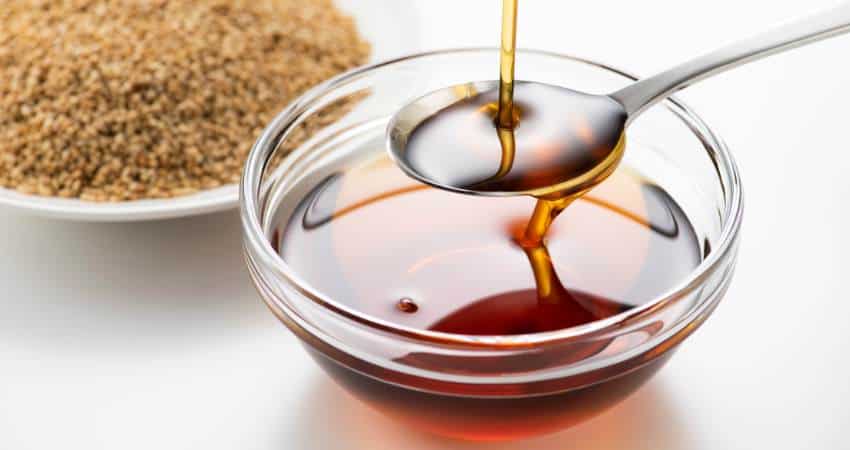
It is made by the following method:
- The seeds are washed to remove unwanted products.
- The seeds are then dried to remove excess water.
- The seeds are then crushed or pressed to remove the oil from the seed.
- The oil is filtered to remove some of the seed left in the oil.
- It is filtered a second time to make sure all the oil cakes are removed from the oil.
- The oil is then bottled for shipping and sale.
Olive Oil
- Made from olives using heat and chemicals.
- Has a mild, peppery flavor.
- Cost less money.
- Has a higher smoke point.
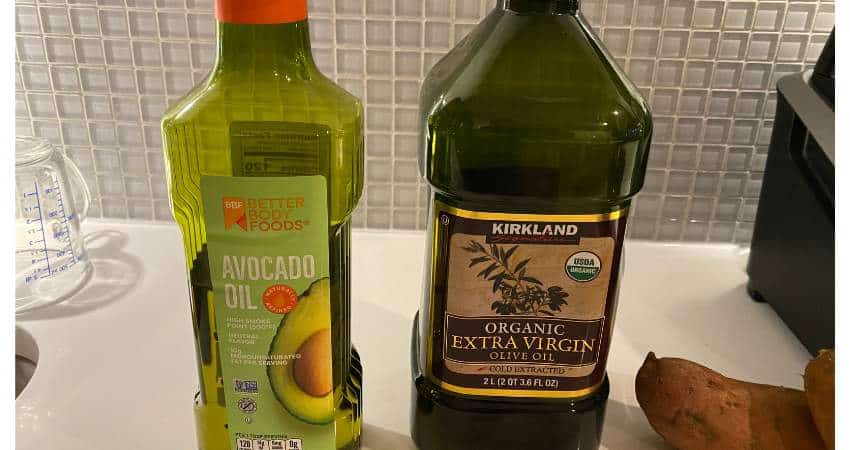
It is made by the following method:
- Made by using the leftover paste from making extra virgin olive oil (EVOO).
- The leftover paste is heated and kneaded with chemicals to release more oil, water and residue from the paste.
- The oil is separated from the water and residue.
- It is filtered and bottled.
Extra Virgin Olive Oil
All olive varieties are held to certain USDA grade standards ((USDA: Grades of Olive Oil)). EVOO is certified as having the highest grade standards for excellent flavor, odor and free fatty acid content. Therefore, versus regular, it is better. The extra virgin oil must not exceed 0.8 grams of oleic acid per 100 grams.
Sesame Oil vs Olive Oil: Nutrition Facts
The following table compares the nutrients contained in one tablespoon:
| Olive Oil (1 Tbsp/13.5 grams) | Sesame Oil (1 Tbsp/13.5 grams) | |
| Calories | 119 | 119 |
| Protein | 0 g | 0 g |
| Carbohydrates | 0 g | 0 g |
| Fiber | 0 g | 0 g |
| Fat | 13.5 g | 13.5 g |
| Sugar | 0 g | 0 g |
| Sodium | 0.27 mg | 0 g |
| Vitamin K | 8.13 mcg | 1.84 mcg |
| Vitamin E | 1.94 mg | 0.19 mg |
| Potassium | 0.135 mg | 0 mg |
| Iron | 0.076 mg | 0 mg |
| Calcium | 0.135 mg | 0 mg |
| Omega-3 | 103 mg | 39 g |
| Omega-6 | 1,318 mg | 5,377 g |
| Saturated Fat | 1.86 g | 1.92 g |
| Monounsaturated Fat | 9.86 g | 5.36 g |
| Polyunsaturated Fat | 1.42 g | 5.63 g |
The nutrients in the table above may differ at times depending on the manufacturer. This may be due to the time of year, olives, when the they were pressed and other factors.
The type of nutrients in olive oil is the same as sesame oil. This may make some people wonder which is healthier?
Both oils are healthy but olive oil is healthier than sesame oil due to its higher percentage of vitamins, minerals and heart healthy fats. Olive oil contains more vitamin K, vitamin E, potassium, iron, and calcium. It contains 84% more heart healthy monounsaturated fats than sesame oil.
Sesame oil is healthy also and contains a good number of healthy fats and antioxidants.
I typically use olive oil the most because of its nutrients and taste. I use it on salads, dipping and low temperature cooking.
A doctor in the following video compares the benefits of olive oil and sesame oil.
Let’s take a closer look at each macro and nutrient closer.
Calories
- They both contain 119 calories per one tablespoon.
Vitamin K
- Olive oil contains more vitamin K per one tablespoon.
Vitamin E
- Olive oil contains 921% more vitamin E per one tablespoon.
Potassium
- Olive oil contains more potassium per one tablespoon.
Iron
- Olive oil contains more iron per one tablespoon.
Calcium
- Olive oil contains more calcium per one tablespoon.
Saturated Fat
- Sesame oil contains 3.3% more saturated fat per one tablespoon.
Monounsaturated Fat
- Olive oil contains 84% more monounsaturated fat per one tablespoon.
Polyunsaturated Fat
- Sesame oil contains 297% more polyunsaturated fat per one tablespoon.
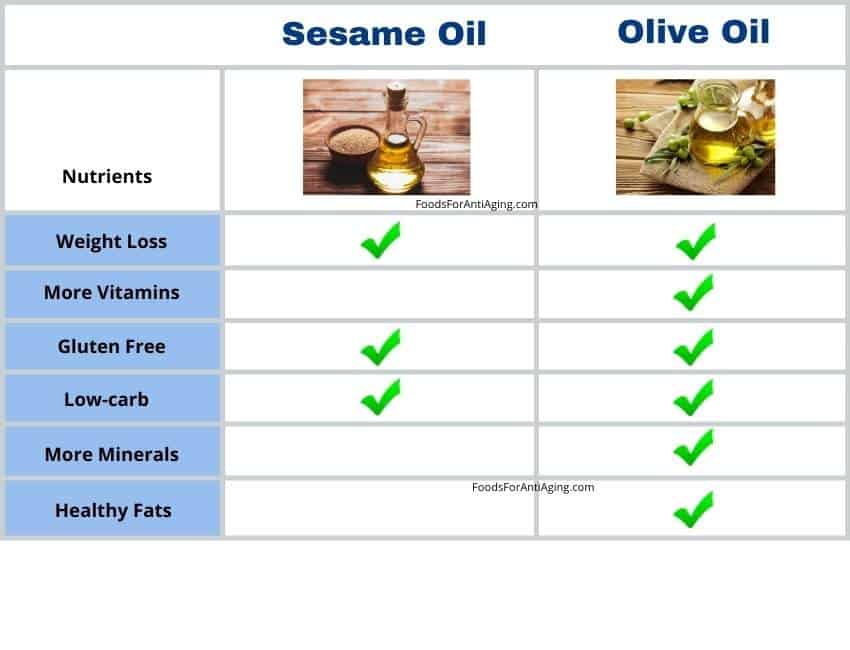
The Taste of Each Oil
Sometimes the taste and texture is all that matters to some people. After all, if someone doesn’t like how a food tastes, they will probably choose to leave it out of their shopping cart.
Therefore, let’s examine how the taste of each one compares.
Olive oil has a slightly stronger flavor than the milder sesame oil. Olive oil has a hint of olives and is peppery. Sesame oil has a mild nutty and earthy flavor. Toasted sesame oil has a stronger flavor than the regular oil.
Both toasted sesame oil and extra virgin olive oil has a stronger flavor.
I wanted to get the opinion of real people like you by conducting some original research. Therefore, I reached out to some clients, members of food groups and readers. I asked, what tastes better?
- 55% said they preferred the taste of olive oil.
- 39% said they preferred the taste of sesame.
- 6% said they had no preference.
To conduct more research I setup and participated in a blind taste test at home. I tried one teaspoon of each oil and ended up choosing the olive oil for its better taste.
In the battle of taste, olive oil tastes better.
The following video explains the benefits of cooking with sesame oil.
Substituting Oils
Have you ever wanted to try a new recipe the last minute and found out you didn’t have one of the ingredients at home? Unable to go out to the store, you’ve probably wondered if you can use another ingredient in its place.
Availability is one reason people will want to substitute one food for the other in a recipe. Other reasons for doing this may include the taste, price, smoke point or just for variety.
This makes people wonder if they can substitute one oil for the other.
Sesame oil and olive oil can substitute for each other in cold or hot recipes due to their similar smoke points. Although the flavor will be slightly different when substituting both oils in some recipes. Sesame oil’s smoke point is only 20°F less than olive oil’s smoke point, so one or the other can be used in most cooking methods.
Olive oil substitutes for high temperature cooking include the following:
- Refined avocado oil
- Safflower oil (refined and neutralized)
- Extra virgin avocado oil
- Pecan oil
- Sesame oil
- Corn oil
- Soybean oil
- Peanut oil
- Refined rice bran oil
Sesame oil substitutes for high temperature cooking include the following:
- Pecan oil
- Safflower oil refined
- Safflower oil neutralized
- Refined olive oil
- Palm oil
- Soybean oil
- Refined rice bran oil
- Peanut oil
- Avocado oil
Smoke Points of Each Oil
The following are the smoke points for each one:
| Type of Oil & Fats | Smoke Point (Fahrenheit) |
| Sesame Oil – Semi-Refined | 450°F |
| Sesame Oil – Unrefined | 350°F |
| Olive Oil – Refined | 470°F |
| Olive Oil – Virgin | 410°F |
| Olive Oil – Extra virgin | 375°F |
Smoke point source ((Wikipedia: Smoke point))
Depending on the type of cooking required for your recipe, the smoke point may help answer, is olive oil better than sesame oil for cooking? If its high temperature cooking, then sesame oil may be better depending on the type of oil used.
Avocado oil has the best smoke point. You may want to find out why avocado oil should be used in my article, 11 Reasons Why You Should Use Avocado Oil for Cooking.
Or for a complete list of the smoke point of all oils, it’s included in my article, A Guide For Frying With Avocado Oil.
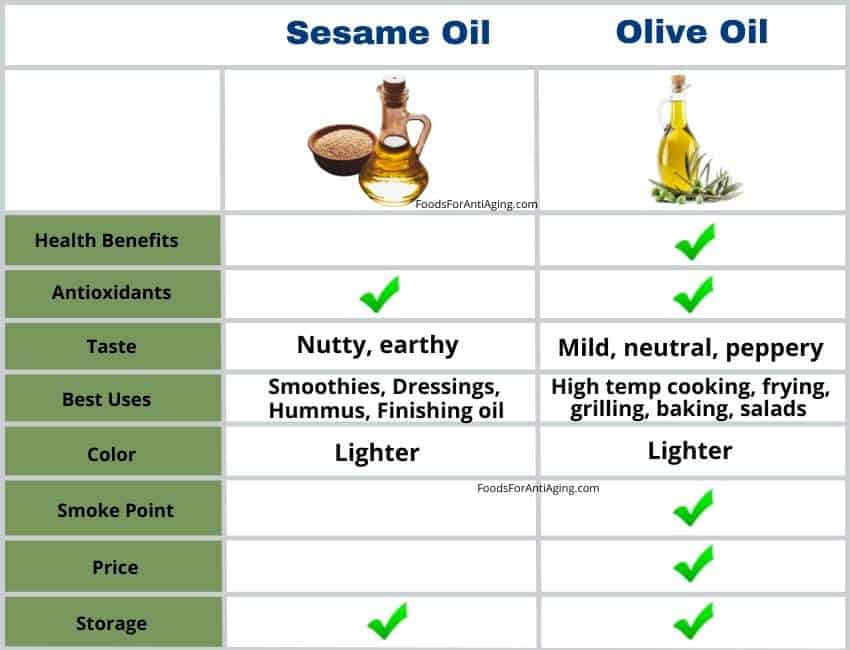
Which to Choose Based on Your Goals
Choosing which one may depend on your particular goal. Therefore, in this section I examine the most common goals and determine which oil is the better choice for each one.
Weight Loss
If you’re looking to lose some extra pounds from the mid-section, the number of calories might matter to you.
Therefore, let’s examine which is better for weight loss.
- Sesame oil and olive oil are similar for weight loss because they contain the same number of calories per tablespoon.
Even though both are considered healthy additions to your diet, at 119 calories per tablespoon the calories can add up pretty fast. It’s easy to add multiple tablespoons into a salad. Always be aware of the amount and try not to overdo it.
Keto or Low Carb Diets
The goal of most low-carb diets is to consume few carbohydrates and add more fat and protein. The numbers can be so limited every carbohydrate can make a difference.
Therefore, let’s examine which one has fewer carbohydrates or more fat.
- Sesame oil and olive oil are both beneficial for low-carb diets due to their similar amount of fat and carbohydrates. Both oils don’t contain any carbohydrates and are a healthy source of fats.
Bodybuilding
If you’re trying to gain lean muscle mass, the amount of protein and carbohydrates may make a difference. Let’s take a look at both and determine which is better for bodybuilding.
Sesame oil and olive oil are similar for bodybuilding because neither oil contains protein or carbohydrates. Both of them contain healthy fats and are a good addition to any bodybuilding diet. When bulking up, the calories from either one may prove beneficial.
Gluten Free
Avoiding any gluten is the main goal for people who wish to follow a gluten free diet or have Celiac disease. Therefore, let’s answer which one is gluten free?
- Sesame oil and olive oil are both gluten free and good for gluten free diets.
Find out how avocado oil compared in my article and find out if it’s better.
Price
The prices for groceries keep increasing. For this reason, I’m sure the regular price of food matters to most people. Therefore, let’s examine the prices of each one.
Sesame oil costs 119% more than olive oil per ounce. Sesame oil average cost per ounce is $0.81 and the average price for olive oil per ounce is $0.37.
To conduct my own research, I checked three different supermarkets located in my area. All the supermarkets are on different levels of pricing. Walmart is the most economical and Stop and Shop being more expensive.
Here are my findings, I first visited Shoprite:
Walmart:
- Sesame (Kikkoman) – 5 ounce $3.76 ($0.75 per ounce)
- Olive (Store brand) – 17 ounce $2.52 ($0.15 per ounce)
Stop and Shop:
- Sesame (Kikkoman) – 5 ounce $4.79 ($0.96 per ounce)
- Olive (California Olive Ranch) – 25.4 ounce $11.79 ($0.46 per ounce)
Shoprite
- Sesame (International Collection) – 8.45 ounce $7.49 ($0.71 per ounce)
- Olive (Cento) – 17 ounce $8.49 ($0.50 per ounce)
Sometimes it’s helpful to compare the unit price. If it’s possible, try to plan your purchases around specials to always get a sale price.
Find out how vegetable oil compares in my article and find out if it is really as bad as they say.

How to Store
Good quality food can be costly, therefore, the longevity you get out of it is important. Let’s examine how each one should be stored.
They both can be stored the same.
Store sesame oil or olive oil in a cool, dark location away from light. It’s best to either one in a tinted glass container. Both oils should be kept at a temperature between 55-60℉, although they can be refrigerated or frozen if needed.
Both of them should be stored in the refrigerator if the room temperature rises above 70℉. Leaving either one in warmer temperatures affects shelf life and lessens the quality of the oil.
Unrefined oil or extra virgin can go bad quicker than refined oils. For this reason many people store them in the refrigerator regardless of the room temperature.
Due to heat-creating appliances and heated ovens, kitchens tend to be a bit warmer than most other rooms of the house. Therefore, be sure to monitor your food and the temperature of the room.
Even though, I store mine in the kitchen cabinet but it’s in a cool area away from heat.
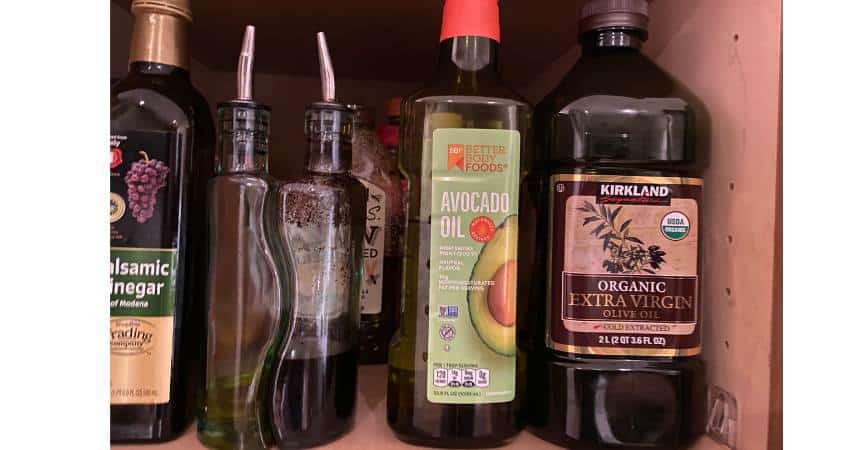
Health Benefits of Olive Oil and Sesame Oil
They both contain a wealth of healthy fats and antioxidants. The fats and antioxidants provide many health benefits which I’ll examine in this section.
Heart Disease
Heart disease and stroke are among the most common causes of death throughout the world. Studies have shown heart disease is lower in the Mediterranean countries where olive oil is a big part of their diets.
There are many ways both oils are beneficial for the heart including the following:
Heart Attacks
The administration of sesame oil contributed to protection against heart attacks due to its antioxidant properties3.
Lowering Blood Pressure
Studies have shown an association between lower blood pressure and an increase in olive oil consumption. The Mediterranean diet has been linked to lower blood pressure and cardiovascular disease4.
Blood Vessel Health
Research has shown sesame oil may help prevent heart disease and slow the development of plaque in the arteries.
Olive oil has been shown to help improve the lining of blood vessels. A study published in 2015 showed blood vessels opened up and increased blood flow in people who included it in their diet5.
Reducing Inflammation
Olive oil is associated with decreases in inflammation which is a main component of heart disease. One of its antioxidants, oleocanthal, is an anti-inflammatory that also reduces pain6.
Find out how sunflower oil compared in my article and find out if it provides the same benefits.
The following video explains a new study on the benefits of olive oil.
Reducing Blood Clotting
Unwanted blood clotting could contribute to heart attacks and strokes. A study in 2017 found weekly consumption of EVOO was beneficial to help prevent unwanted blood clotting7.
LDL (Bad) Cholesterol
A study involving 48 people found those who consumed 4 tablespoons of sesame oil per day experienced greater reductions in bad cholesterol and fat cells in the blood. This was compared with those who consumed olive oil8.
Studies have shown the polyphenols decrease oxidative stress biomarkers and improve LDL cholesterol9.
Cancer
The cancer rates in Mediterranean countries is lower than other places.
Antioxidants are believed to contribute to the killing of cancer cells. In a 2015 study, oleocanthal, a phenolic compound present in both of them, helped kill cancer cells in less than one hour10.
Another study published in 2015 evaluated the consumption of the Mediterranean diet and the incidence of breast cancer. For a six-year period, 4,282 women aged 60 to 80 years followed three different diets:
- Mediterranean diet supplemented with EVOO.
- Mediterranean diet supplemented with mixed nuts.
- A reduced fat diet.
After 4.8 years 35 of the women developed breast cancer. The lowest rate of breast cancer was seen in the women who supplemented with the EVOO11.
Oleic acid which both are rich in, has been associated with helping to reduce the risk of cancers.
Arthritis
Many studies have shown how sesame oil has been linked to improvements in arthritis. In one such study, it was given to rats who experienced reduced joint pain and arthritic symptoms12.
Brain Health
Alzheimer’s disease is the most common form of dementia causing problems with thinking, memory and behavior. A common feature of the disease is the build-up of proteins known as beta-amyloid plaques in certain neurons in the brain.
Animal studies have shown EVOO to clear the beta-amyloid proteins from the brain helping to prevent Alzheimer’s disease13.
Several studies conducted on humans have shown the Mediterranean diet may be associated with a reduced risk of cognitive problems and dementia14.
Research has shown unsaturated fats may be beneficial reducing the risk of dementia and heart disease.
You may want to check out my comparison with butter in my article. Is butter really that bad?

If you have any questions about this article don’t hesitate to email us. You can find an email on our contact page.
Read More Oil Related Articles!
Olive Oil vs Coconut Oil: Which is Better? Let’s Compare
Olive Oil vs Soybean Oil: Which is Better? Let’s Compare
Olive Oil vs Canola Oil: Which is Better? Let’s Compare
Extra Virgin Olive Oil vs Olive Oil: A Complete Comparison
The Complete Guide To Storing Extra Virgin Olive Oil
Can Extra Virgin Olive Oil Go Bad? What You Need To Know
Can I Replace Olive Oil With Coconut Oil?
This is the Best Way to Store Your Olive Oil
- USDA: Oil, olive, salad or cooking [↩]
- USDA: Oil, sesame, salad or cooking [↩]
- National Center for Biotechnology Information: Putative antioxidant property of sesame oil in an oxidative stress model of myocardial injury [↩]
- National Center for Biotechnology Information: Virgin Olive Oil and Hypertension [↩]
- (National Center for Biotechnology Information: Effects of Olive Oil on Markers of Inflammation and Endothelial Function-A Systematic Review and Meta-Analysis [↩]
- National center for Biotechnology Information: Olive Oil-related Anti-inflammatory Effects on Atherosclerosis: Potential Clinical Implications [↩]
- National Center for Biotechnology Information: A review on management of cardiovascular diseases by olive polyphenols [↩]
- National Center for Biotechnology Information: Olive and Sesame Oil Effect on Lipid Profile in Hypercholesterolemic Patients, Which Better? [↩]
- National Center for Biotechnology Information: Olive Oil Polyphenols Decrease LDL Concentrations and LDL Atherogenicity in Men in a Randomized Controlled Trial [↩]
- Taylor & Francis Online: (-)-Oleocanthal rapidly and selectively induces cancer cell death via lysosomal membrane permeabilization [↩]
- Jama Internal Medicine: Mediterranean Diet and Invasive Breast Cancer Risk Among Women at High Cardiovascular Risk in the PREDIMED Trial [↩]
- National Center for Biotechnology Information: Enteral sesame oil therapeutically relieves disease severity in rat experimental osteoarthritis [↩]
- National Center for Biotechnology Information: Extra-Virgin Olive Oil Attenuates Amyloid-β and Tau Pathologies in the Brains of TgSwDI Mice [↩]
- National Center for Biotechnology Information: Mediterranean Diet and Risk of Dementia and Alzheimer’s Disease in the EPIC-Spain Dementia Cohort Study [↩]
